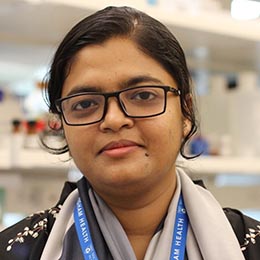
Postdoctoral Research Fellow
Department of Biomedical Informatics, Harvard Medical School
Department of Neurology, Brigham and Women’s Hospital
Dr. Sumaiya Nazeen is a postdoctoral research fellow in the laboratories of Professor Shamil Sunyaev in the Department of Biomedical Informatics at the Harvard Medical School, and Professor Vikram Khurana in the Department of Neurology at the Brigham and Women's Hospital. She is also a remote associate member of the Broad Institute of MIT and Harvard. Her research focuses on the development of computational and statistical models for the interpretation of genetic foundation of complex human diseases. Computational integration of large-scale functional and comparative genomics datasets can provide insight into the disease-associated sequence variants and their likely molecular roles. Sumaiya’s research aims at designing better tools for furthering such insight. Her current projects include network-based rare variant analysis, patient stratification, biomarker discovery, and therapeutic target identification for complex diseases.
Sumaiya was awarded International Fulbright
Science & Technology Fellowship in 2012, and Ludwig Center for Molecular
Oncology Graduate Fellowship in 2015 for her research. Sumaiya pursued her bachelor’s
degree from the Department of Computer Science and Engineering (CSE) at
Bangladesh University of Engineering and Technology (BUET) and graduated summa
cum laude receiving both the Chancellor’s award and the Prime Minister’s
gold medal. She completed her S.M. and Ph.D. in Computer Science under the
supervision of Prof. Bonnie Berger at MIT in 2014 and 2019, respectively. Prior
to coming to MIT, she served as a lecturer in the Department of CSE, BUET.

Postdoctoral Research Fellow
Department of Biomedical Informatics, Harvard Medical School
Department of Neurology, Brigham and Women’s Hospital
Dr. Sumaiya Nazeen is a postdoctoral research fellow in the laboratories of Professor Shamil Sunyaev in the Department of Biomedical Informatics at the Harvard Medical School, and Professor Vikram Khurana in the Department of Neurology at the Brigham and Women's Hospital. She is also a remote associate member of the Broad Institute of MIT and Harvard. Her research focuses on the development of computational and statistical models for the interpretation of genetic foundation of complex human diseases. Computational integration of large-scale functional and comparative genomics datasets can provide insight into the disease-associated sequence variants and their likely molecular roles. Sumaiya’s research aims at designing better tools for furthering such insight. Her current projects include network-based rare variant analysis, patient stratification, biomarker discovery, and therapeutic target identification for complex diseases.
Sumaiya was awarded International Fulbright
Science & Technology Fellowship in 2012, and Ludwig Center for Molecular
Oncology Graduate Fellowship in 2015 for her research. Sumaiya pursued her bachelor’s
degree from the Department of Computer Science and Engineering (CSE) at
Bangladesh University of Engineering and Technology (BUET) and graduated summa
cum laude receiving both the Chancellor’s award and the Prime Minister’s
gold medal. She completed her S.M. and Ph.D. in Computer Science under the
supervision of Prof. Bonnie Berger at MIT in 2014 and 2019, respectively. Prior
to coming to MIT, she served as a lecturer in the Department of CSE, BUET.
Journal article
Gene networks encapsulate biological knowledge, often linked to polygenic diseases. While model system experiments generate many plausible gene networks, validating their role in human phenotypes requires evidence from human genetics. Rare variants provide the most straightforward path for such validation. While single-gene analyses often lack power due to rare variant sparsity, expanding the unit of association to networks offers a powerful alternative, provided it integrates network...
Journal article
Whether neurodegenerative diseases linked to misfolding of the same protein share genetic risk drivers or whether different protein-aggregation pathologies in neurodegeneration are mechanistically related remains uncertain. Conventional genetic analyses are underpowered to address these questions. Through careful selection of patients based on protein aggregation phenotype (rather than clinical diagnosis) we can increase statistical power to detect associated variants in a targeted set of genes...